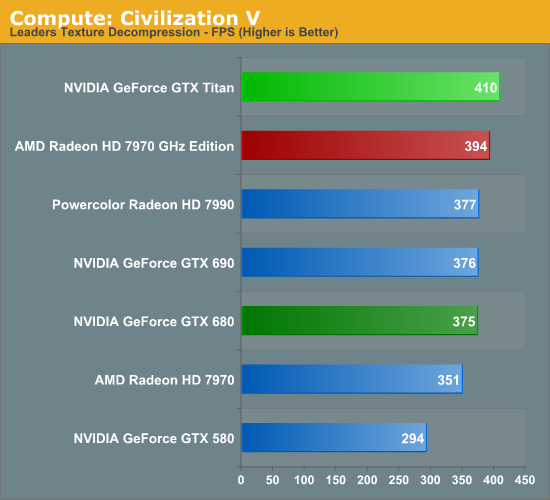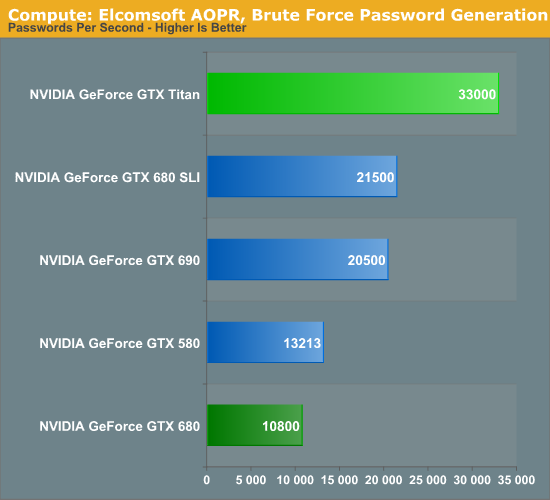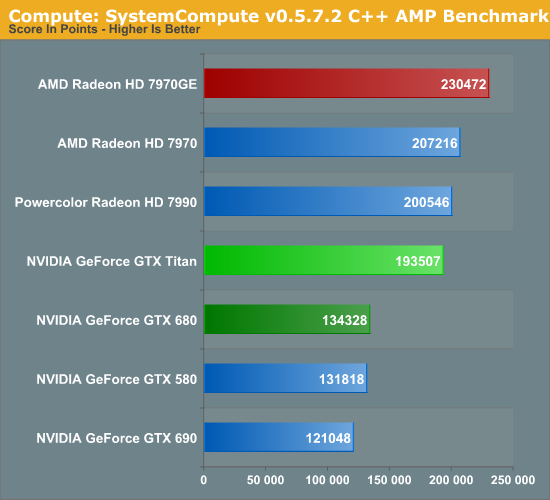NVIDIA’s GeForce GTX Titan Review, Part 2: Titan's Performance Unveiled
by Ryan Smith & Rahul Garg on February 21, 2013 9:00 AM ESTTitan’s Compute Performance, Cont
With Rahul having covered the basis of Titan’s strong compute performance, let’s shift gears a bit and take a look at real world usage.
On top of Rahul’s work with Titan, as part of our 2013 GPU benchmark suite we put together a larger number of compute benchmarks to try to cover real world usage, including the old standards of gaming usage (Civilization V) and ray tracing (LuxMark), along with several new tests. Unfortunately that got cut short when we discovered that OpenCL support is currently broken in the press drivers, which prevents us from using several of our tests. We still have our CUDA and DirectCompute benchmarks to look at, but a full look at Titan’s compute performance on our 2013 GPU benchmark suite will have to wait for another day.
For their part, NVIDIA of course already has OpenCL working on GK110 with Tesla. The issue is that somewhere between that and bringing up GK110 for Titan by integrating it into NVIDIA’s mainline GeForce drivers – specifically the new R314 branch – OpenCL support was broken. As a result we expect this will be fixed in short order, but it’s not something NVIDIA checked for ahead of the press launch of Titan, and it’s not something they could fix in time for today’s article.
Unfortunately this means that comparisons with Tahiti will be few and far between for now. Most significant cross-platform compute programs are OpenCL based rather than DirectCompute, so short of games and a couple other cases such as Ian’s C++ AMP benchmark, we don’t have too many cross-platform benchmarks to look at. With that out of the way, let’s dive into our condensed collection of compute benchmarks.
We’ll once more start with our DirectCompute game example, Civilization V, which uses DirectCompute to decompress textures on the fly. Civ V includes a sub-benchmark that exclusively tests the speed of their texture decompression algorithm by repeatedly decompressing the textures required for one of the game’s leader scenes. While DirectCompute is used in many games, this is one of the only games with a benchmark that can isolate the use of DirectCompute and its resulting performance.
Note that for 2013 we have changed the benchmark a bit, moving from using a single leader to using all of the leaders. As a result the reported numbers are higher, but they’re also not going to be comparable with this benchmark’s use from our 2012 datasets.

With Civilization V having launched in 2010, graphics cards have become significantly more powerful since then, far outpacing growth in the CPUs that feed them. As a result we’ve rather quickly drifted from being GPU bottlenecked to being CPU bottlenecked, as we see both in our Civ V game benchmarks and our DirectCompute benchmarks. For high-end GPUs the performance difference is rather minor; the gap between GTX 680 and Titan for example is 45fps, or just less than 10%. Still, it’s at least enough to get Titan past the 7970GE in this case.
Our second test is one of our new tests, utilizing Elcomsoft’s Advanced Office Password Recovery utility to take a look at GPU password generation. AOPR has separate CUDA and OpenCL kernels for NVIDIA and AMD cards respectively, which means it doesn’t follow the same code path on all GPUs but it is using an optimal path for each GPU it can handle. Unfortunately we’re having trouble getting it to recognize AMD 7900 series cards in this build, so we only have CUDA cards for the time being.

Password generation and other forms of brute force crypto is an area where the GTX 680 is particularly weak, thanks to the various compute aspects that have been stripped out in the name of efficiency. As a result it ends up below even the GTX 580 in these benchmarks, never mind AMD’s GCN cards. But with Titan/GK110 offering NVIDIA’s full compute performance, it rips through this task. In fact it more than doubles performance from both the GTX 680 and the GTX 580, indicating that the huge performance gains we’re seeing are coming from not just the additional function units, but from architectural optimizations and new instructions that improve overall efficiency and reduce the number of cycles needed to complete work on a password.
Altogether at 33K passwords/second Titan is not just faster than GTX 680, but it’s faster than GTX 690 and GTX 680 SLI, making this a test where one big GPU (and its full compute performance) is better than two smaller GPUs. It will be interesting to see where the 7970 GHz Edition and other Tahiti cards place in this test once we can get them up and running.
Our final test in our abbreviated compute benchmark suite is our very own Dr. Ian Cutress’s SystemCompute benchmark, which is a collection of several different fundamental compute algorithms. Rahul went into greater detail on this back in his look at Titan’s compute performance, but I wanted to go over it again quickly with the full lineup of cards we’ve tested.

Surprisingly, for all of its performance gains relative to GTX 680, Titan still falls notably behind the 7970GE here. Given Titan’s theoretical performance and the fundamental nature of this test we would have expected it to do better. But without additional cross-platform tests it’s hard to say whether this is something where AMD’s GCN architecture continues to shine over Kepler, or if perhaps it’s a weakness in NVIDIA’s current DirectCompute implementation for GK110. Time will tell on this one, but in the meantime this is the first solid sign that Tahiti may be more of a match for GK110 than it’s typically given credit for.










337 Comments
View All Comments
vps - Thursday, February 21, 2013 - link
For compute benchmark you might want to take a look at FAHBenchFAHBench is the official Folding@Home GPU benchmark. It measures the compute performance of GPUs for Folding@Home.
http://proteneer.com/blog/?page_id=1671
Some reference scores are here:
http://foldingforum.org/viewtopic.php?f=38&t=2...
Ryan Smith - Thursday, February 21, 2013 - link
FAHBench is primarily an OpenCL benchmark (there's a CUDA path, but it's effectively on its way out). It's on our list, and is one of the things we couldn't run due to the fact that OpenCL is not currently working on Titan.Hrel - Thursday, February 21, 2013 - link
PowerDirector still uses CUDAatlr - Thursday, February 21, 2013 - link
Not sure if this helps. I found CLBenchmark results of a Titan versus a 7970 here.http://clbenchmark.com/compare.jsp?config_0=144702...
atlr - Thursday, February 21, 2013 - link
Ville Timonen posted results running his own code on a Tesla K20 versus the usual suspects. Might be helpful to folks considering options for GPGPU computation.http://wili.cc/blog/gpgpu-faceoff.html
chizow - Thursday, February 21, 2013 - link
That's the first thing that comes to mind now when I think of Nvidia, which is a shame because that name used to be synonymous with Awesome. That's gone and replaced with a disdain for ridiculous levels of usury with their last two high-end product launches. I'm not going to be disingenuous and claim I'm going AMD, because the fact of the matter is, Nvidia products are still in a class of it's own for my usage needs, but I will certainly not be spending as much on Nvidia parts as I used to.Kepler has basically set back Nvidia's product stack back by half a generation, but my price:performance metrics will stay the same. Nvidia has their ultra-premium "Xtreme Edition" GPU this round, but that only came about as a result of AMD's ridiculous pricing and overall lackluster performance of the 7970 for a "flagship" card. Either way, I think it will be difficult for Nvidia to sustain this price point, as expectations just got higher at that $1K range.
@Ryan: I'm disappointed you didn't write a harsher commentary on the fact Nvidia is now charging 2x for the same class of GPU, pricing that has stayed true since 2006. Even the G80 Ultra didn't approach this $1K mark. Given how many times Nvidia has had to backpedal and apologize about the Ultra's pricing, you would think they would learn from their mistakes. I guess not, I hope they are prepared to deal with the long-term ramifications, backlash, and loss of goodwill stemming from this pricing decision.
CeriseCogburn - Thursday, February 21, 2013 - link
7.1 billion transistors and 6G of ram.I for one am sick of you people constantly whining.
If we check the whine log from the ATI32 days you were doing it then, too.
It's all you people do. Every time, all the time.
chizow - Friday, February 22, 2013 - link
And all you do is post inane, barely intelligible nonsense in defense of Nvidia. If you check your "whine logs" you'll see I've done my fair share of defending Nvidia, but I can't and won't give them a pass for what they've done with Kepler. AMD started it for sure with the terribad price:performance of Tahiti, but Nvidia has taken it to a new level of greed.And for all the idiots who are going to reply "herr dueerr Nvidai need make money not a charity derrr", my advanced reply is that Nvidia has made money in all but 2-3 quarters since 2006 without selling a single $1K desktop GPU. In fact, they enjoyed record profits, margin and revenue on the back of a $250 GPU, the 8800GT in 2007-2008.
CeriseCogburn - Saturday, February 23, 2013 - link
Nope, you are the crying whining baby who says the same thing in 100 different posts here, and has no clue what "the economy" of "the world" has been doing for the past several years.Whatever.
Please go cry about all the other computer part prices that are doing the same thing.
CeriseCogburn - Saturday, February 23, 2013 - link
I mean you idiots want the same price for more perf over a DECADE. Meanwhile, the rest of the worlds pricing has DOUBLED.Now, computer prices used to drop across the board, but they just aren't doing it anymore, and IDIOTS like yourself continue on your stupid frikkin rants, ignoring the world itself, not to mention the LACK of production in that world for the GPU's you whine about. It's really funny how stupid you are.